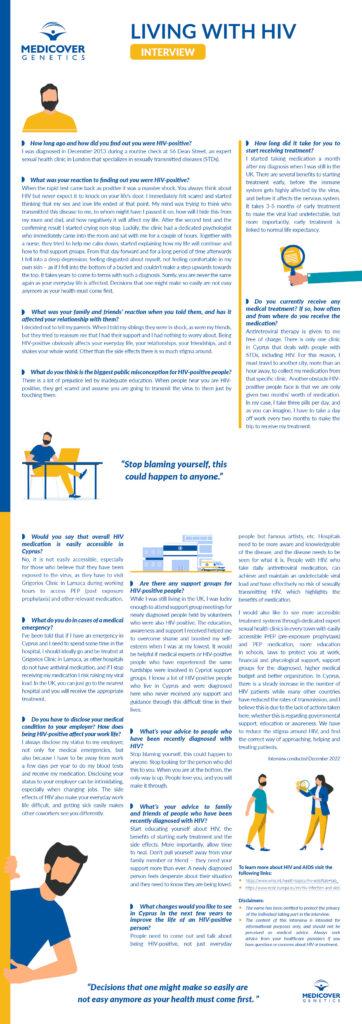Human immunodeficiency virus, commonly known as HIV, is a virus that attacks the immune system of the affected person and more specifically, white blood cells known as CD4 cells. HIV gradually destroys the immune system, and if left untreated, it will eventually lead to acquired immunodeficiency syndrome (AIDS). AIDS severely compromises the immune system, leaving the body unable to fight off even the simplest illness.
HIV can be transmitted mainly through unprotected sexual intercourse, either between men, or between men and women, and by sharing of needles. Contrary to public misconceptions, the virus cannot be transmitted easily, for example via saliva, sweat, or physical contact with an affected person, as these do not contain a viral load high enough to cause infection.
Despite being a global public health issue for over 40 years, HIV has no cure. Antiretroviral therapy (ART), which became available in the late 1980s, has saved millions of lives worldwide, as it can stop HIV from progressing and can significantly reduce the risk of an HIV-positive person passing the virus to someone else. This highlights the importance of starting treatment as soon as possible after diagnosis. Despite ART’s many benefits, there are a lot of adverse side effects that affect daily living such as regular visits to the toilet, difficulty sleeping, vivid dreams, headaches, cold sweats, and vulnerability to other diseases. If left untreated, HIV will destroy CD4 cells, leaving the person vulnerable against fungal and bacterial infections, and even some cancers.
According to recent reports, in the past decade, rates of HIV diagnoses have declined in many European countries. Unfortunately, this is not the case for Cyprus. Since 2012, HIV diagnoses in Cyprus have more than doubled, with the most common age of diagnosis being 30-39 years old. Apart from the clinical impact, HIV-affected people are also left to face stigma and discrimination from their public, social, work and healthcare encounters. In an effort to understand the struggles an HIV-positive person faces and to raise awareness, we interviewed a Cypriot living with HIV.
The above information was based on the 2022 report series published jointly by ECDC and the World Health Organization (WHO) Regional Office for Europe, that has been reporting data on HIV and AIDS in the WHO European Region since 2008.
The questions covered in this interview are:
- How long ago and how did you find out you were HIV-positive?
- What was your reaction to finding out you were HIV-positive?
- What was your family and friends’ reaction when you told them, and has it affected your relationship with them?
- What do you think is the biggest public misconception for HIV-positive people?
- How long did it take for you to start receiving treatment?
- Do you currently receive any medical treatment? If so, how often and from where do you receive the medication?
- Would you say that overall HIV medication is easily accessible in Cyprus?
- What do you do in cases of a medical emergency?
- Do you have to disclose your medical condition to your employer? How does being HIV-positive affect your work life?
- Are there any support groups for HIV-positive people?
- What’s your advice to people who have been recently diagnosed with HIV?
- What’s your advice to family and friends of people who have been recently diagnosed with HIV?
- What changes would you like to see in Cyprus in the next few years to improve the life of an HIV-positive person?
Click on the image below to read the full article in PDF format.

















